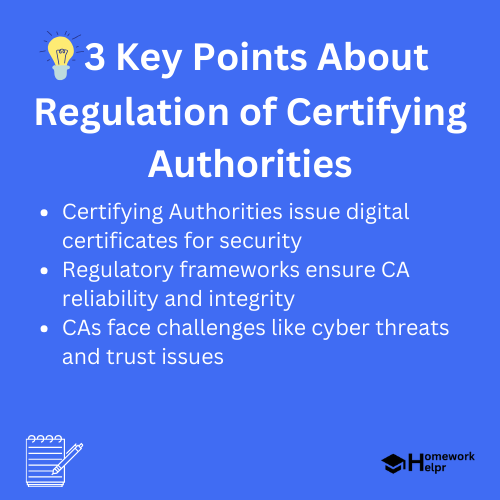📝 Summary
In the digital age, Certifying Authorities (CAs) are vital for establishing online trust through the issuance of digital certificates. These certificates authenticate the identity of individuals and organizations, ensuring secure online transactions. CAs play a crucial role in preventing identity theft, enhancing security, and building trust in e-commerce. Regulation of CAs is essential for their credibility and includes components such as licensing, compliance standards, and audits. Despite their importance, CAs face challenges, including cyber threats, trust issues, and evolving regulations. Understanding the role and regulation of CAs is essential for maintaining the integrity of online interactions.
Regulation of Certifying Authorities
In the age of digital communication and online transactions, the need for security and trust has become paramount. Certifying Authorities (CAs) play a critical role in establishing that trust by issuing digital certificates. This article aims to shed light on the importance, functions, and regulatory framework concerning certifying authorities, ensuring that students gain a comprehensive understanding of this significant topic.
What Are Certifying Authorities?
A Certifying Authority is a trusted entity that issues digital certificates. These digital certificates authenticate the identity of individuals and organizations on the internet. When you see a “https://” in a web address, it typically indicates that the site is secured by a CA-issued certificate. This ensures that information exchanged on that site is secure. The role of CAs is pivotal in protecting sensitive data, such as personal details and financial transactions.
Definition
Digital Certificate: An electronic document used to prove the ownership of a public key and its relationship with its owner.
Example
For instance, when you connect to your bank‚’ website, the bank uses a digital certificate issued by a CA to reassure you that you are indeed communicating with the bank and not a fraudulent site.
The Importance of Certifying Authorities
Certifying Authorities are essential for several reasons:
- Establishing Identity: CAs help in verifying the identities of entities online, which prevents identity theft.
- Enhancing Security: They contribute to the overall security of online transactions, ensuring that data remains encrypted.
- Building Trust: CAs foster trust between users and online services, paving the way for effective e-commerce.
Imagine trying to shop online without knowing if the seller is genuine! CAs remove that uncertainty and allow us to engage securely with various online platforms.
The Regulatory Framework for Certifying Authorities
The regulation of CAs is crucial to ensure their reliability and integrity. Governments and international organizations have developed regulatory frameworks to monitor and control their activities. Below are some key components of these frameworks:
- Licensing: A CA must be licensed by a governing authority before it can issue digital certificates.
- Compliance Standards: There are strict standards that CAs must adhere to, such as the WebTrust and ETSI standards.
- Auditing: Regular audits are conducted to ensure compliance with regulations and to verify that CAs are operating securely.
Definition
WebTrust: A framework for CAs to receive independent assurance that they comply with accepted security practices.
Example
For example, if a CA fails a security audit, it might lose its license to operate, which ensures that only reliable authorities can certify sensitive transactions.
Challenges Faced by Certifying Authorities
Despite their critical role, certifying authorities face several challenges:
- Cyber Threats: The digital landscape is fraught with cyber-attacks, making it imperative for CAs to constantly upgrade their security systems.
- Trust Issues: Instances of compromised certificates can lead to a loss of trust among users.
- Regulatory Changes: CAs must keep pace with evolving regulations to avoid penalties and maintain their licenses.
These challenges underscore the importance of vigilance and adaptability for CAs to continue serving their role effectively.
💡Did You Know?
The first digital certificate was issued in 1995, revolutionizing online security!
Conclusion
In summary, Certifying Authorities play an indispensable role in maintaining the security and integrity of online communications. Through their regulation, they build trust and protect users from various digital threats. Understanding this intricate system is essential, especially for those venturing into the world of technology and digital transactions. As students, it‚’ crucial to grasp the significance of these authorities and the responsibilities they carry in our increasingly connected world.
Moving forward, we must advocate for better regulations and practices in the realm of certifying authorities, ensuring that our online interactions remain secure and trustworthy.

Related Questions on Regulation of Certifying Authorities
What is a Certifying Authority?
Answer: A Certifying Authority is a trusted entity that issues digital certificates to authenticate identities online.
How do Certifying Authorities enhance security?
Answer: CAs enhance security by verifying identities, ensuring data encryption, and fostering trust in online transactions.
What regulations apply to Certifying Authorities?
Answer: CAs must comply with licensing requirements, adherence to standards like WebTrust, and undergo regular audits to maintain their integrity.
What challenges do Certifying Authorities face?
Answer: CAs face challenges such as cyber threats, trust issues due to compromised certificates, and the need to adapt to changing regulations.
